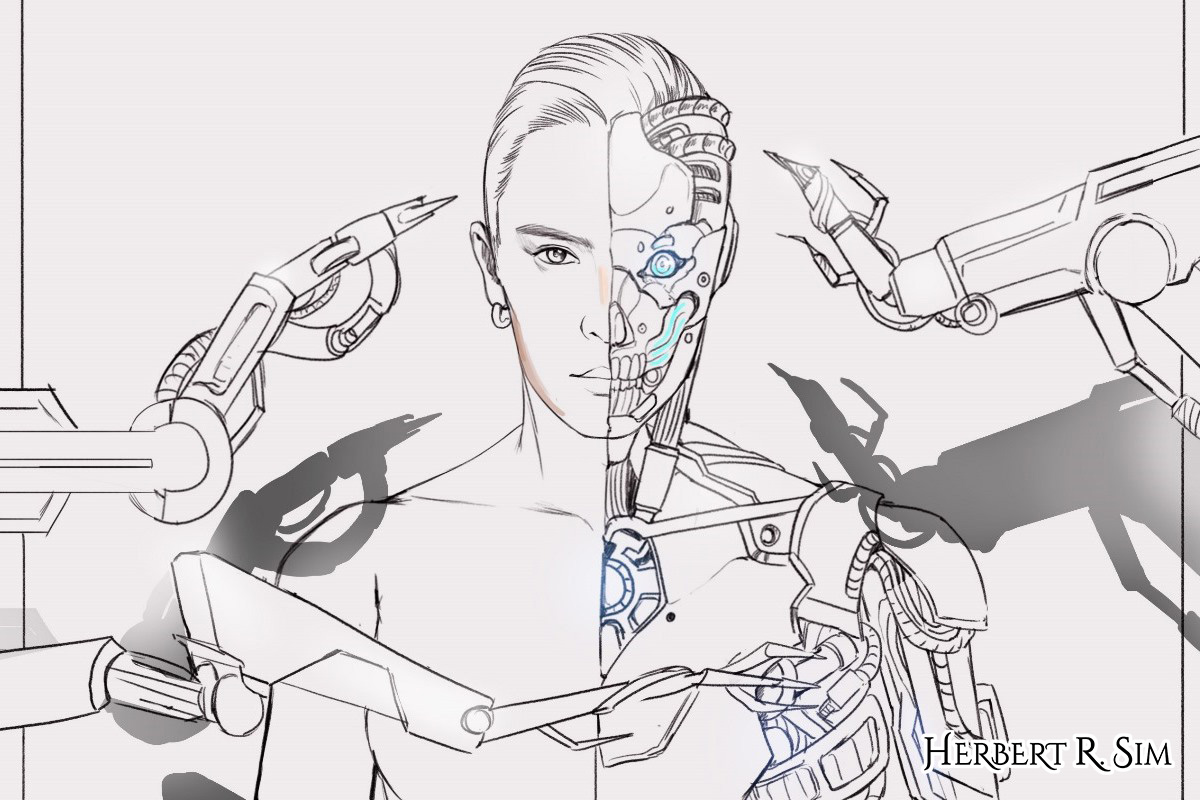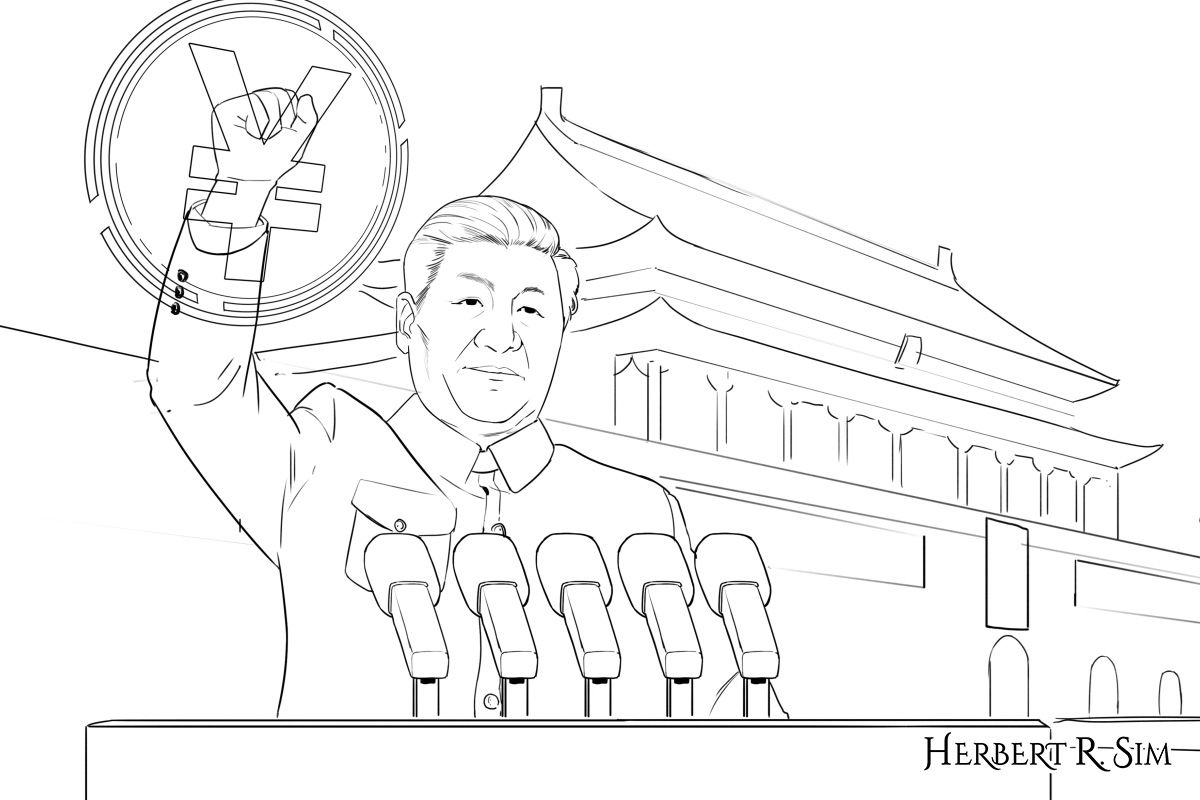In my latest illustration, it features world leaders ��Elon Musk,�Putin, Narendra Modi, Klaus Schwab, Pope Francis,�Xi Jinping, Ursula von der Leyen, Justin Trudeau, Mark Zuckerberg, Bill Gates. ������������������� A quiet, high-stakes battle is brewing in the world of technology,...
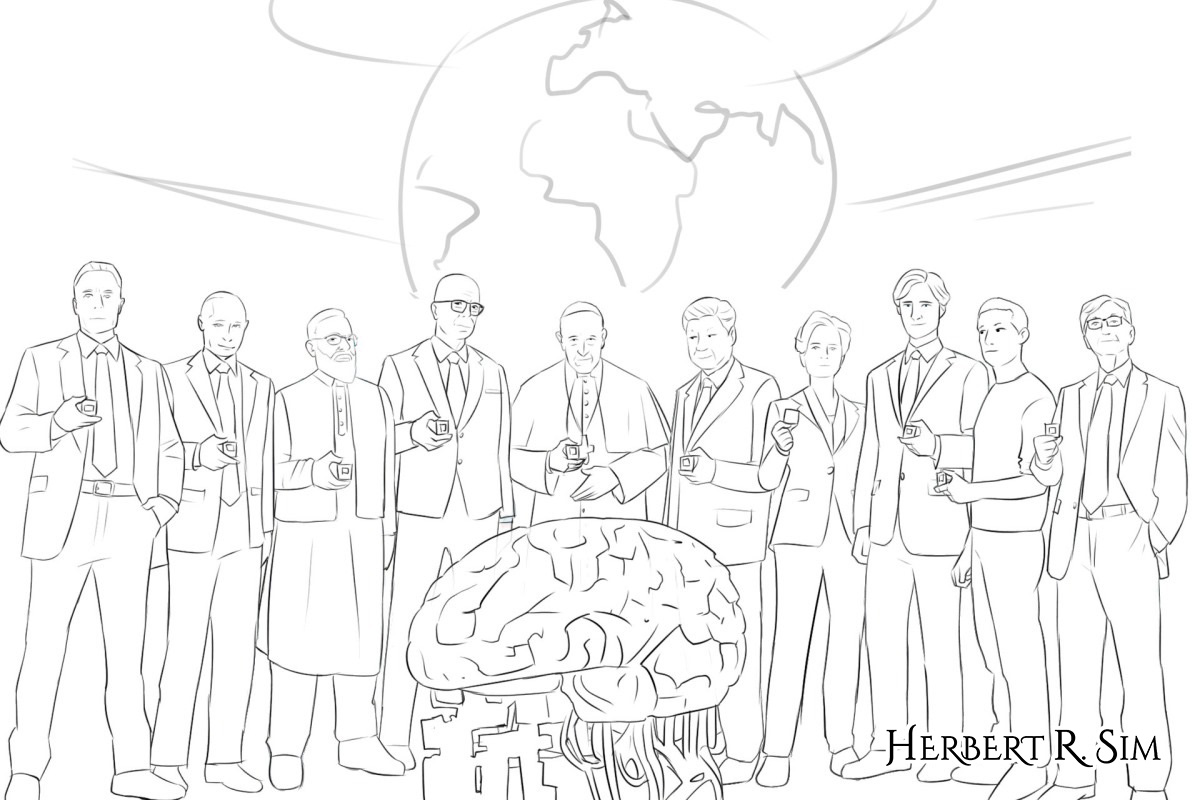
In my latest illustration, it features world leaders ��Elon Musk,�Putin, Narendra Modi, Klaus Schwab, Pope Francis,�Xi Jinping, Ursula von der Leyen, Justin Trudeau, Mark Zuckerberg, Bill Gates.
�������������������
A quiet, high-stakes battle is brewing in the world of technology, a war over what�s projected to be the most valuable commodity of the future: computer chips. Echoing the scramble for oil that defined much of the 20th century, the 21st century is witnessing an escalating race for control over these minute bits of modern technology. The competition, however, is not limited to conventional chips that power our devices but also to the production of another innovative invention � the neurochip.
The changing landscape of technology
In recent times, the bursting popularity of artificial intelligence (AI) has created a demand for increasingly complex and powerful computer chips, we�ve seen the likes of computer chip company Nvidia hitting $1 Trillion market cap too. From autonomous vehicles and advanced robotics to quantum computers, chips are playing an ever more significant role in our technological advancement.
Neurochips: The future of human-computer interaction
More than ever, the neurochip, a new frontier of technological advancements, is expected to become an intrinsic part of the human experience in the not-so-distant future. These chips, when embedded in the human brain, promise to bridge the divide between the biological and the digital world.
Imagine having an AI assistant that resides within your mind, providing a host of capabilities just by thinking. Instant translations of foreign languages, real-time research to answer your queries, quick calculations, scheduling, and even helping with everyday activities like shopping and ordering food.
This science-fiction scenario may become a reality sooner than we realise, which is why world powers are racing to control this industry. With the distinctions between human intelligence and artificial intelligence becoming increasingly blurred, the potential societal repercussions are tremendous. A new era of increased cognition and communication could usher in, transforming the way we live, work, and communicate.
�������������������
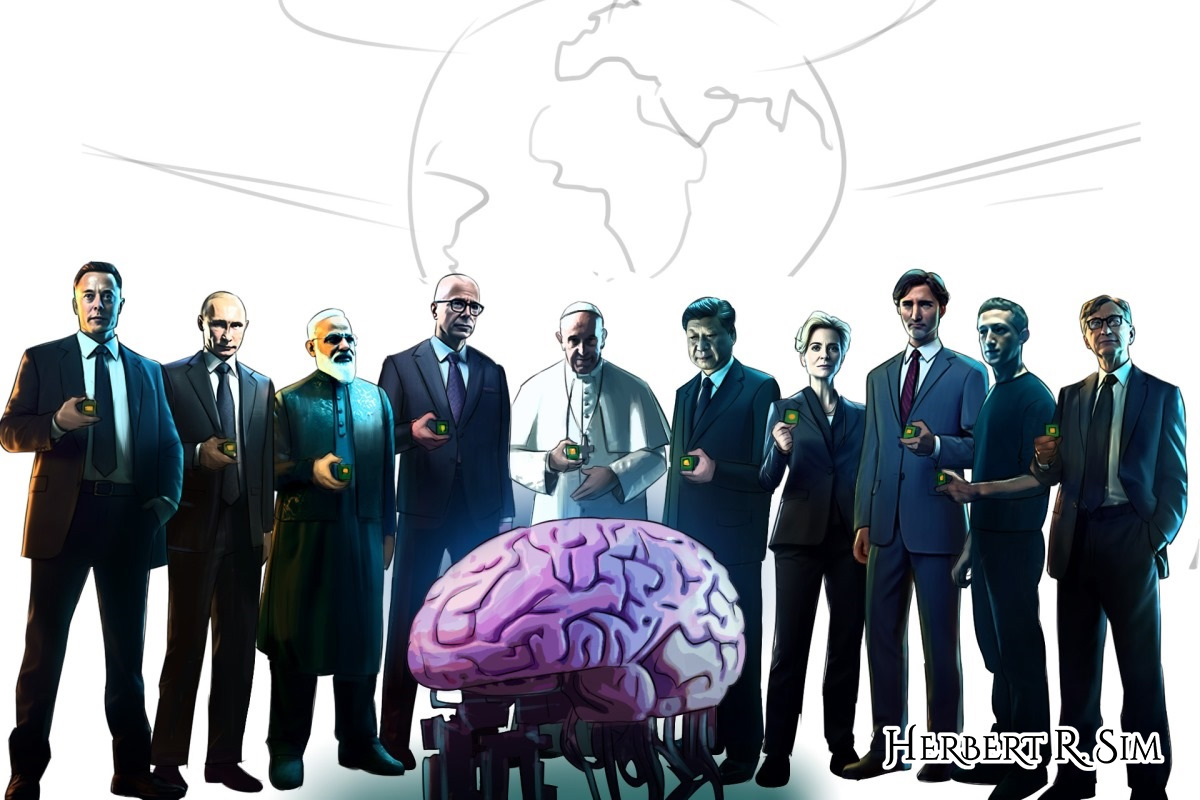
This art is my own interpretation of�the Bible�s book of Revelation �Beast from the Sea�, with�seven heads and ten horns � 10 leaders, of which 7 of them are politicians.
�������������������
The race for global chip domination
This vision of the future has sparked a race among countries and corporations alike. Warren Buffett has recently made headlines by shedding billions in shares from Taiwan Semiconductor Manufacturing Co (TSMC), a leading global computer chip maker. This move, in fact, underscores the escalating importance of chip technology and its growing geopolitical implications, particularly, between the US and China. With fierce competition comes a certain level of friction, as can be seen when American media made light of China�s struggles in chip-making.
Simultaneously, the NATO alliance is actively seeking an agreement with China on military AI, highlighting the complicated geopolitical factors that the struggle for chip technology has begun to produce. Given the power that comes with command of AI technology, the development reinforces the gravity of the problem. Such agreements could, however, pave the way for worldwide AI and chip technology norms and laws, changing the landscape of future military and defence operations.
Back in the United States, significant efforts have been made to strengthen domestic chip production. The U.S government has recently committed to bolstering the domestic chip industry with an injection of $52 billion, a move that is set to spur a wave of innovation and production among U.S tech firms like Intel and AMD that are already at the forefront of global chip production. This strategic decision is not merely an economic one but a matter of national security, acknowledging the integral role chips play when it comes to defence, infrastructure, and other pillars of society.
As was mentioned earlier, the race for neurochip development and supremacy is particularly pronounced between the US and China. Both countries recognize the technology�s enormous potential and have been active in their pursuit of the hallowed crown.
In the US, tech giants like Neuralink, co-founded by Elon Musk, are pioneering the development of neurochip technology. Neuralink is working on implantable brain�machine interfaces (BMIs) with the goal of merging humans with AI, allowing humans to interact with computers directly from their brains.
Meanwhile, China is also making significant strides. The country�s robust semiconductor industry and massive investments in AI research have fostered an environment conducive to neurochip advancements. Chinese tech conglomerate, Tencent, for instance, has been investing heavily in medical technology startups, including those focusing on neural interfaces. The Chinese government�s support, including financial backing and regulatory facilitation, further enhances the nation�s position in this technological race.
Pressing concerns
Of course, as the boundary between man and machine becomes blurred, ethical concerns regarding neurochips and their potential misuse might surface.
One pressing concern is privacy. Since neurochips can facilitate a direct interface between our brains and digital systems, protecting one�s thoughts would become a paramount concern. In an era where data privacy issues have sparked widespread debate and controversy, introducing technology that could potentially access and even manipulate one�s thoughts may seem unthinkable. Safeguarding neural data from unauthorised access will undoubtedly pose significant technological and legal challenges.
Closely linked to privacy is the issue of cognitive autonomy. Neurochips could potentially be used to influence or even control an individual�s thoughts or behavior. Therefore, safeguards must be put in place to ensure that these devices cannot be used maliciously, whether it�s to push unwanted advertising, propagate disinformation, or exert undue influence over individuals. Preserving the sanctity and autonomy of our own minds in the age of neurochips is a significant concern that must be addressed.
�������������������
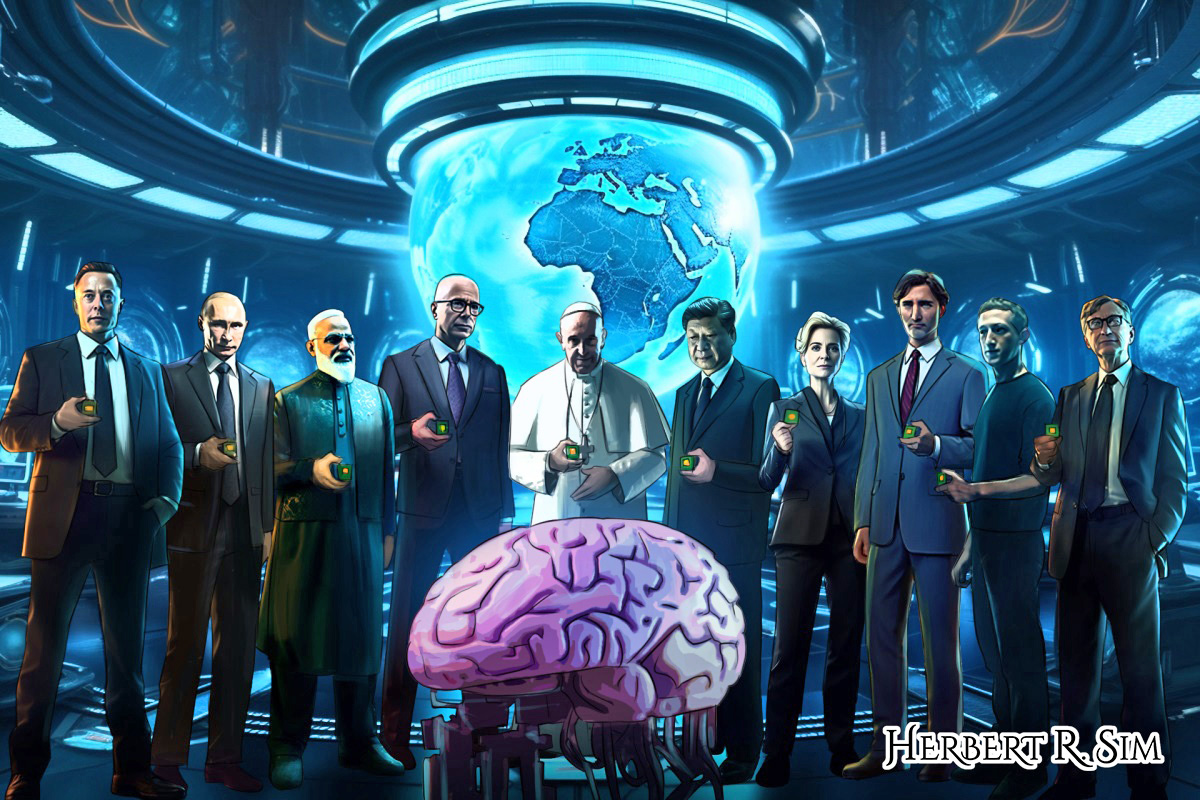
The world leaders are all about to insert the computer chips into the giant brain infront of them, which signifies the brains of the people of the world. One World Government is coming!
�������������������
Chips are the future
As neurochip technology continues to evolve, the fight for chip dominance is likely to become even more intense. Even non-traditional tech players like Facebook, led by Mark Zuckerberg, are showing interest in computer chips, signaling a future where every major company may have a stake in the chip industry.
Given the pace of developments, it�s evident that the war over computer chips is more than just corporate competition. It�s a struggle for technological supremacy, control over AI, and the power to shape the future of human evolution. The reality of having an AI assistant embedded in our brains may sound like a far-fetched dream today, but the reality may be closer than we think.
As the world gears up for this race, it is crucial to keep in mind the profound implications that this technology will have on society. Beyond the immediate economic and geopolitical consequences, the advent of AI-enabled neurochips could redefine our very understanding of human cognition and the nature of intelligence itself.
The post The Emerging Battlefront: The Global Scramble for Dominance in Computer Chips appeared first on Herbert R. Sim.




